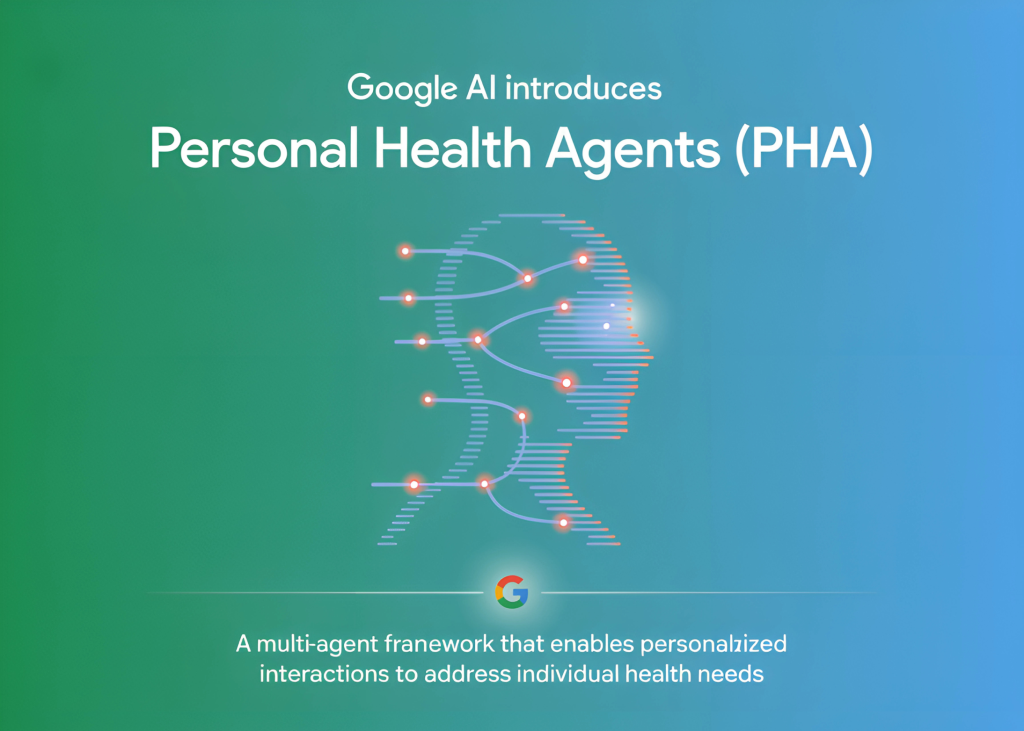Blog
Google AI Introduces Personal Health Agent (PHA): A Multi-Agent Framework that Enables Personalized Interactions to Address Individual Health Needs

Introduction to Google AI’s Personal Health Agent
In recent years, artificial intelligence has made groundbreaking strides, particularly in the healthcare sector. One of the latest innovations is Google AI’s Personal Health Agent (PHA), a sophisticated multi-agent framework designed to provide personalized interactions tailored to individual health needs. In this blog post, we’ll explore how this technology works, its potential benefits, and the implications for healthcare in the future.
What is the Personal Health Agent (PHA)?
The Personal Health Agent is an AI-driven platform that utilizes a multi-agent framework to interact with users regarding their health concerns. By leveraging machine learning and natural language processing, PHA offers personalized responses and support for a variety of health-related issues. This innovation marks a significant advancement in the way technology can assist individuals in managing their health.
Key Features of the PHA
-
Personalization: At the core of PHA is its capability to customize interactions based on individual user profiles. It Adaptively learns from user inputs, enabling more relevant and tailored responses.
-
Multi-Agent System: Instead of relying on a single model, PHA operates through a network of specialized agents, each proficient in different areas of health care. This allows for a broader scope of support, from fitness advice to chronic condition management.
-
Real-Time Interaction: The PHA provides instant responses, making it an invaluable tool for individuals needing immediate guidance or information regarding their health.
- Comprehensive Health Data Integration: The framework allows seamless integration with various health applications and devices. This enables users to receive holistic feedback based on their overall health data, enhancing the accuracy of the advice provided.
How the PHA Works
Data Collection and User Interaction
The first step in utilizing the Personal Health Agent involves data collection. Users typically input their health history, preferences, and current conditions. This data serves as a foundation for personalized interactions. The more information the agent has, the better it can tailor its responses.
Machine Learning Algorithms
Once the data is collected, advanced machine learning algorithms process this information. These algorithms help the PHA to understand patterns and predict user needs effectively. Over time, the AI continuously learns and evolves, which results in progressively more accurate interactions.
Collaboration with Healthcare Professionals
While the PHA offers a wealth of information and support, it is not intended to replace healthcare professionals. Instead, it serves as a supplement, providing users with health management tools that can be discussed during professional consultations. This collaborative approach enhances patient care and ensures that individuals are well-informed about their options.
The Benefits of Using the PHA
Enhanced Engagement in Personal Health
The Personal Health Agent encourages users to take an active role in managing their health. By providing personalized information and tools, individuals are more likely to engage with their health proactively. This increased engagement can lead to better health outcomes and improved quality of life.
Accessibility of Health Information
One of the significant advantages of PHA is the democratization of health information. Users from diverse backgrounds can access tailored advice without having to navigate complex medical jargon. It eliminates barriers, making health management more straightforward for everyone.
Immediate Guidance
In emergency situations or when health queries arise, having instant access to reliable information can be crucial. The PHA’s real-time interaction capability ensures that users can obtain timely guidance, which may alleviate concerns and provide support in critical moments.
Monitoring Chronic Conditions
For individuals with chronic health issues, continuous monitoring and management are vital. The PHA can provide ongoing support, track health metrics, and deliver advice on lifestyle adjustments, medication adherence, and more. This functionality helps users stay on top of their health and fosters a collaborative approach to chronic disease management.
Future Implications of the PHA
Evolution of Healthcare Delivery
The introduction of the Personal Health Agent signifies a shift towards a more personalized healthcare model. This evolution emphasizes the importance of individualized care, where treatments and guidance are tailored to each patient’s unique needs.
Integration with Telehealth Services
As telehealth continues to grow in popularity, the integration of the PHA can enhance remote consultations. Patients can share insights gathered from their AI interactions, leading to more productive discussions with healthcare providers.
Addressing Mental Health Needs
The PHA framework has the potential to extend its capabilities to mental health support as well. By providing users with coping strategies, mindfulness exercises, and mood tracking, this AI can play a role in promoting mental well-being. This dual focus on physical and mental health could reshape how we approach overall wellness.
Challenges and Ethical Considerations
Data Privacy Concerns
With increased data collection comes heightened concerns over privacy and security. Ensuring that user information is protected is paramount. Developers and health institutions must implement robust security measures to safeguard sensitive health data.
Dependence on Technology
While PHA offers numerous benefits, it’s essential to remain cautious about over-dependence on technology for health management. Users should be encouraged to maintain regular check-ups and consultations with healthcare professionals, ensuring that technology complements rather than replaces human interaction.
Equity in Access
Ensuring equitable access to AI-driven health solutions is another significant consideration. Rural areas or populations with limited internet access may face challenges in utilizing such technology effectively. Addressing these disparities will be crucial to realizing the full potential of the Personal Health Agent.
Conclusion
Google AI’s Personal Health Agent represents an exciting leap forward in the integration of technology and healthcare. By offering personalized interactions and support, PHA empowers individuals to take charge of their health while fostering a collaborative environment with healthcare providers. As we look toward the future, embracing the benefits and addressing the challenges posed by this innovative technology will be essential to improving health outcomes for all. The Personal Health Agent is not just a tool—it’s a partner in health.

